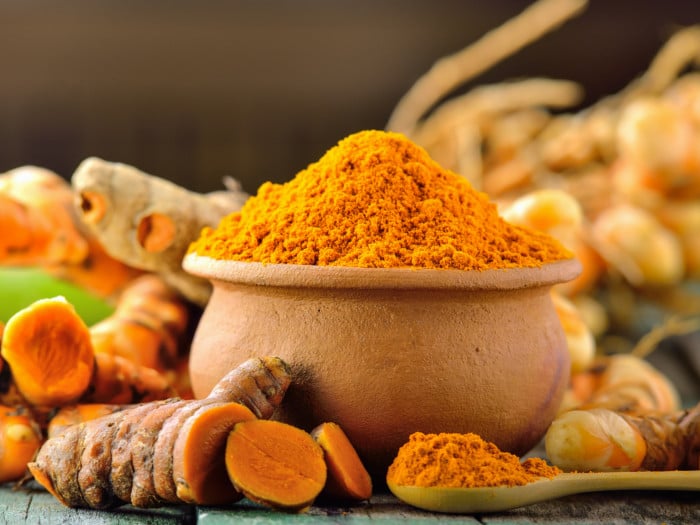Turmeric, the ancient spice superfood, has powerful anti-inflammatory and health-boosting properties. It is used in healing drinks such as golden milk which is popular all over the world. Turmeric does not usually cause any significant side effects. Using turmeric as a spice in food and drink is generally safe in small amounts. However, people can suffer from the turmeric side effects of turmeric due to several reasons, like adulteration of the spice or food allergies. Also, the market is flooded with turmeric (curcumin) supplements and capsules, and taken in excess may cause health problems.
Turmeric (Curcumin) Side Effects
When you consume too much turmeric, or when you have an allergic reaction to this spice, it may result in gastrointestinal problems such as (diarrhea, bloating), liver damage, and skin allergies. Let us look at the potential turmeric side effects in detail. [1]
May Cause Abdominal Pain & Bloating
If you take a high dosage of curcumin, the active compound in turmeric, it is possible that you may suffer from gastrointestinal problems. Researchers at The University of Texas MD Anderson Cancer Center discovered that in some of the clinical trials to test curcumin for cancer therapy, certain participants suffered from abdominal pain and distress. In a clinical trial published in the journal Nutrition and Cancer, 17 advanced pancreatic cancer patients were given 8000 mg of curcumin daily, by mouth for four weeks. Five patients discontinued the curcumin dosage within a few days to two weeks due to abdominal bloating and pain. In two other patients, the dosage of curcumin was halved because of stomach pain. [2] [3]

Turmeric has a plethora of skin benefits. Photo Credit: Shutterstock
May Cause Skin Allergy
There is evidence that topical turmeric/curcumin products and supplements may have therapeutic benefits for skin health. However, it may cause skin allergies in some people. In a clinical trial by Ramadasan Kuttan, Ph.D. et al., an ointment which had curcumin as its active ingredient was applied on external cancer lesions. While the overall result was positive in that it reduced the lesion size, an adverse reaction was seen in one of the 62 patients evaluated. [4] [5]
As a precautionary measure, it is better to test new cosmetic products on your wrist area to check for possible reactions on skin before adding them to your everyday regimen.
May Interfere with Blood Thinners
Curcumin in turmeric can interfere with blood thinning medications such as warfarin and clopidogrel. A research report Purdue University in the United States includes turmeric as one of the herbal products that can increase the risk of bleeding or increase the blood thinning ability of warfarin. [6] [7]
People taking curcumin supplements with blood-thinning medications need to check with their doctor as it can reduce blood clotting time and may increase bleeding, especially if they are undergoing any kind of surgery.
May Cause Liver Damage
While there is no clear evidence that turmeric or curcumin can prevent or treat cancer, laboratory studies, published in Cancer Prevention Research, show that the spice has great potential in cancer prevention as it has an anticancer effect on cells. Also, the website Cancer Research UK states that: “So far, research studies seem to show that it causes few or no turmeric side effects. But we don’t know much about the side effects of taking it in large amounts to treat or prevent cancer”. [8] [9]
However, the research organization does caution against using certain turmeric-based food supplements, as they can cause liver damage. The signs for liver damage include jaundice, dark urine, abdominal pain, unusual fatigue, and loss of appetite.
May Increase Risk of Kidney Stone Formation
A study by Tang et al. suggested that intake of turmeric significantly increased urinary oxalate levels. The researchers concluded, based on a 4-week study on 11 volunteers (21-38 years old), that consumption of turmeric supplemental doses can increase the risk of kidney stone formation in certain individuals. [10]
Turmeric Side Effects: Takeaway
Most randomized clinical trials of turmeric usage for therapeutic use for cardiovascular benefits or cancer therapy show that there were no serious adverse reactions reported. In general, curcumin may be used as a complementary therapeutic treatment along with conventional medication. However, further research is needed to determine the dosage and frequency of curcumin supplements. So, it is best to speak to your doctor before adding turmeric supplements to your diet.
